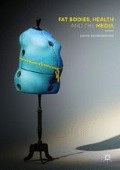Abstract
The makeover offers a fertile site to discuss the representational repertoire that constitutes the fat sensibility because its movement—the propulsion from a ‘before’ (the untransformed state) to the ‘after’ or ‘reveal’ (the transformed state)—depends on a shift between different ‘sets’ of representations. Although the relations of hostile and benevolent fatism are more muddied than the discrete narrative bookends of ‘before’ and ‘after’ suggest, these bookends enable discussion of these ‘sets’ at their most starkly drawn. The ‘before’ and ‘after’ then can be approached as the modelling of a dysfunctional and ideal selfhood, respectively, an approach that encourages our critical interrogation of what/who is imagined as needing a makeover and what passes as the successful result. Over this and the next chapter I follow the trajectory of the makeover: this chapter concerns itself with ‘before’; the next examines the often neglected ‘middle’ and the ‘after’. These chapters suggest that the pedagogical function of these shows lies not in weight loss but in a celebration of a new ‘healthy’ subjectivity and guidance around its shape and performativity. As such, these chapters support the central concern of this book to think about what representations of fat achieve: the fat sensibility not only charts the patterns of repeated representations of fat but, more crucially, thinks about how these offer up new subjectivities, the contours of which flow into the terraforming ambitions of various neoliberal projects. In this chapter, we can start to see how a new subjectivity is forged from the abject nature of the old.
Access this chapter
Tax calculation will be finalised at checkout
Purchases are for personal use only
Notes
- 1.
In an attempt to reduce the further objectification of the participants in the makeover shows, I am not using their real names.
References
Anker, E. 2005. “Villains, Victims and Heroes: Melodrama, Media, and September 11”. Journal of Communication 55(1): 22–31.
Beagan, B.L., E.M. Power, E. Gwen, and G.E. Chapman. 2015. “‘Eating Isn’t Just Swallowing Food’: Food Practices in the Context of Social Class Trajectory”. Canadian Food Studies 2(1): 75–98.
Blaine, B. 2007. Understanding the Psychology of Diversity. London: Sage.
Bogunia-Borowska, M. 2014. “The Cuisine Culture from a Polish Perspective. How Popular TV Programmes Use Cooking to Create a Modern Lifestyle and Present the New Middle Class”. Paper delivered at the XVIII ISA World Congress of Sociology, Yokohama, July 13–19.
Colls, R., and B. Evans. 2014. “Making Space for Fat Bodies? A Critical Account of ‘the Obesogenic Environment’”. Progress in Human Geography 38(6): 733–753.
Elliott, C.D. 2007. “Big persons, Small Voices: on Governance, Obesity, and the Narrative of the Failed Citizen”. Journal of Canadian Studies 41(3): 134–149.
Gailey, J.A. 2014. The Hyper(in)visible Fat Woman. London: Palgrave.
Grindstaff, L., and S. Murray. 2015. “Reality Celebrity: Branded Affect and the Emotion Economy”. Public Culture 27(1): 109–135.
Guthman, J. 2009. “Teaching the Politics of Obesity Insights into Neoliberal Embodiment and Contemporary Politics”. Antipode 41(5): 1110–1133.
Guthman, J. 2013. “Fatuous Measures: the Artificial Construction of the Obesity Epidemic”. Critical Public Health 23(3): 263–273.
Heyes, C. 2007. “Cosmetic Surgery and the Televisual Makeover”. Feminist Media Studies 7: 17–32.
Holland, K., R.W. Blood, and S. Thomas. 2015. “Viewing The Biggest Loser: Modes of Reception and Reflexivity Among Obese People”. Social Semiotics 25(1): 16–32.
Joffe, H., and C. Staerklé. 2007. “The Centrality of the Self-Control Ethos in Western Aspersions Regarding Outgroups: A Social Representational Approach to Stereotype Content”. Culture & Psychology 13: 395–418.
Kendrick, R. 2008. “We Can Change the Face of This Future”. Australian Feminist Studies 23(57): 389–400.
Klos, L.A., C. Greenleaf, N. Paly, M.M. Kellser, C.G. Shoemaker, and E.A. Suchla. 2015. “Losing Weight on Reality TV: A Content Analysis of the Weight Loss Behaviours and Practices Portrayed on The Biggest Loser”. Journal of Health Communication 20: 639–646.
Knowlton-Le Roux, L. 2007. ‘Reading American fat in France: Obesity and Food culture’. European Journal of American Studies 2. http://ejas.revues.org/1363.
Levy-Navarro, E. 2012. “I’m the New Me: Compelled Confession in Diet Discourse”. Journal of Popular Culture 45(2): 340–356.
Lustig, R.H. 2014. Fat Chance: The Hidden Truth About Sugar, Obesity and Disease. London: Fourth Estate.
Mendible, M. 2004. “Humiliation, Subjectivity, and Reality TV”. Feminist Media Studies 4(3): 335–38.
Norman, M.E., G. Rail, and S. Jette. 2014. “Moving Subjects, Feeling Bodies: Emotion and the Materialization of Fat Feminine Subjectivities in A Village On a Diet’”. Fat Studies 3: 17–31.
Raisborough, J. 2011. Lifestyle Media and the Formation of the Self. London: Palgrave.
Ringrose, J., and V. Walkerdine. 2008. “Regulating the Abject: The TV Make-Over as Site of Neoliberal Reinvention Toward Bourgeois Femininity”. Feminist Media Studies 8(3): 227–46. http://www.socresonline.org.uk/13/6/2.html
Savage, M. 2003. “Review Essay: A New Class Paradigm”. British Journal of Sociology of Education 24(4): 535–41.
Sender, K. 2012. The Makeover: Reality Television and Reflexivity. New York: New York University Press.
Shugart, H.A. 2010. “Consuming Citizen: Neoliberating the Obese Body”. Communication, Culture, and Critique 3(1): 105–126.
Skeggs, B. 2004. Class, Self, Culture. London: Routledge.
Sukhan, T. 2012. “Bootcamp, Brides and BMI: Biopedagogical Narratives on Health and Belonging on Canadian Size-transformation Television”. Television and New Media 14(3): 194–210.
Warin, M., T. Zivkovic, V. Moore, P.R. Ward, and M. Jones. 2015. “Short Horizons and Obesity Futures: Disjuctures Between Public Health Interventions and Everyday Temporalities”. Social Science and Medicine 128: 309–315.
Weintraub, P. 2012. “Lighten Up”. Psychology Today 45(2): 70–77.
Author information
Authors and Affiliations
Copyright information
© 2016 The Editor(s) (if applicable) and The Author(s)
About this chapter
Cite this chapter
Raisborough, J. (2016). The Before: Fat Gets Ready for a Makeover. In: Fat Bodies, Health and the Media. Palgrave Macmillan, London. https://doi.org/10.1057/978-1-137-28887-5_5
Download citation
DOI: https://doi.org/10.1057/978-1-137-28887-5_5
Published:
Publisher Name: Palgrave Macmillan, London
Print ISBN: 978-1-137-28886-8
Online ISBN: 978-1-137-28887-5
eBook Packages: Social SciencesSocial Sciences (R0)

